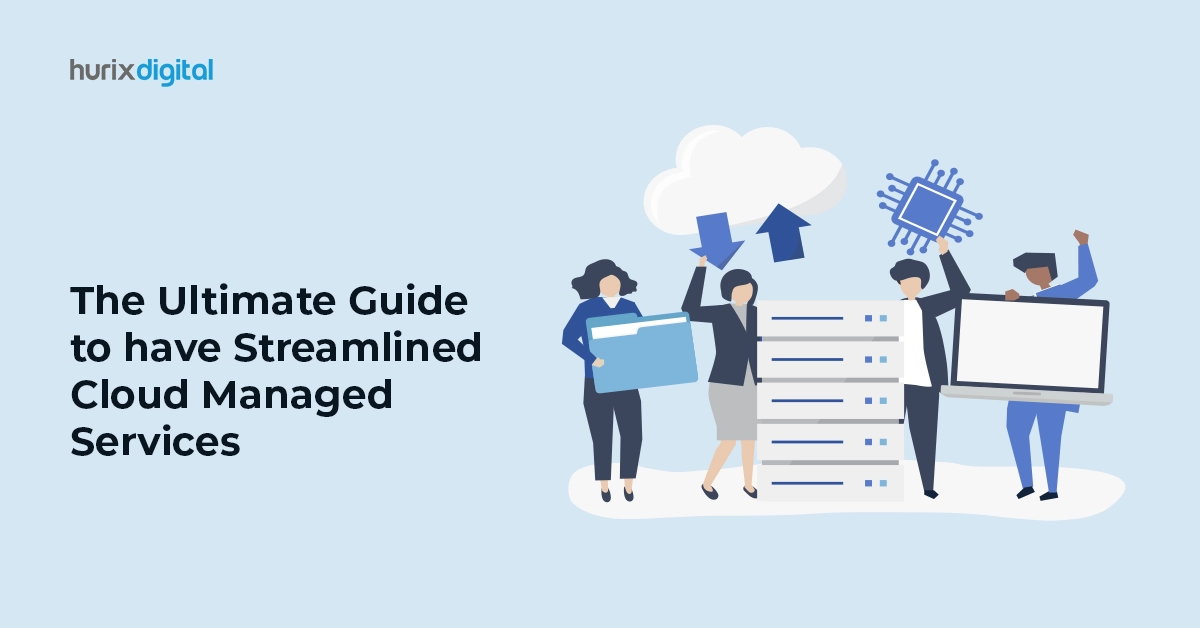
The Ultimate Guide for Streamlined Cloud-Managed Services
Summary
Explore best practices for managing cloud services efficiently. This guide offers insights into streamlining cloud management for improved performance and cost-effectiveness.
In today’s world of daily evolving digital technology, businesses are opting for cloud technology to streamline operations, enhance scalability, and drive innovation. However, managing cloud infrastructure and services can be complex and demanding, requiring specialized expertise and resources. This is where cloud-managed services step in, offering a tailored solution to effectively oversee and optimize cloud environments.
In this blog, we delve into the world of cloud-managed services.
Table of Contents:
- What is Cloud Managed Services?
- Five Key Success Factors about Cloud Managed Services Delivery
- Why Choose Cloud Managed Services?
- Conclusion
What is Cloud Managed Services?
Cloud-managed services refer to outsourcing various IT responsibilities to third-party service providers, who assume monitoring, maintenance, technology lifecycle, change, and problem management along with on-demand support of a company’s cloud-based infrastructure and services.
- Performance Monitoring and Optimization: MSPs continuously monitor the performance and health of cloud infrastructure and applications to identify potential bottlenecks, optimize resource utilization, and enhance overall performance. This proactive approach helps ensure optimal user experience and operational efficiency.
- Preventive Maintenance: It is essential for ensuring optimal performance and reliability in cloud-based infrastructures. By proactively identifying and addressing potential issues before they escalate, organizations can minimize downtime and avoid costly disruptions to their operations. This proactive approach involves Scheduled updates, Log rotation, Indexing, Hotfixes, Release Management, Patches, and Backups. It ensures that systems remain up-to-date and secure against emerging threats.
By implementing a comprehensive preventive maintenance strategy, businesses can maximize the efficiency and longevity of their cloud environments, ultimately supporting seamless operations and driving business success.
- Infrastructure Management: This involves the provisioning, configuration, and optimization of cloud infrastructure components such as servers, storage, networking, and virtualization resources. Managed service providers (MSPs) ensure that infrastructure resources are properly allocated, scaled, and maintained to meet the evolving needs of the business.
- Data Management and Backup: MSPs implement robust data management strategies to safeguard critical business data stored in the cloud. This includes data backup, replication, archival, and disaster recovery planning to mitigate the risk of data loss or corruption.
- Cyber Security and Compliance: Ensuring the security of cloud environments is paramount to protect sensitive data and mitigate cyber threats. Cloud-managed service providers deploy advanced security measures such as encryption, firewalls, intrusion detection/prevention systems, and regular security audits to uphold compliance with industry regulations and standards.
- Change and Problem Management: In the dynamic landscape of cloud computing, changes to configurations, applications, or infrastructure can significantly impact performance and security. Effective change management involves careful planning, testing, and implementing alterations to minimize disruptions and ensure seamless transitions. Additionally, problem management focuses on identifying, analyzing, and resolving issues that arise within the cloud environment. This includes investigating root causes, implementing corrective actions, and continuously improving processes to prevent recurrences. By prioritizing change and problem management, organizations can mitigate risks, enhance reliability, and optimize the performance of their cloud services.
- 24/7 Support and Troubleshooting: One of the key benefits of cloud-managed services is access to round-the-clock technical support and rapid issue resolution. MSPs offer responsive support services to address any technical issues, downtime, or service disruptions promptly, minimizing impact on business operations.
Also Read: The Role of Web Hosting in Website Development: Shared, VPS, Dedicated, and Cloud Hosting
Five Key Success Factors about Cloud Managed Services Delivery
In today’s fast-paced digital landscape, businesses increasingly turn to cloud-managed services to enhance operational efficiency, drive innovation, and stay competitive. However, the success of cloud-managed service delivery hinges on several key factors that ensure seamless onboarding, proactive monitoring, preventive maintenance, strategic advisement, and technology lifecycle management. Let’s delve into these critical success factors and understand their importance in delivering exceptional cloud-managed services.
1. Onboarding a Customer IT Infrastructure
Successful onboarding sets the stage for a fruitful partnership between the managed service provider (MSP) and the client. It involves meticulously understanding the client’s IT infrastructure, applications, workflows, and business objectives. By conducting a thorough assessment, the MSP can develop a tailored onboarding strategy that seamlessly meets the client’s expectations towards their cloud infrastructure to minimize disruptions. Clear communication, effective project management, and a well-defined transition plan are crucial for a smooth onboarding process.
2. Setting up the Right Proactive Monitoring
Proactive monitoring forms the backbone of effective cloud management, enabling MSPs to anticipate and address potential issues before they escalate. Implementing robust monitoring tools and strategies allows MSPs to continuously monitor the performance, health, and security of the cloud environment. By proactively identifying and resolving issues, such as performance bottlenecks, security vulnerabilities, or capacity constraints, MSPs ensure optimal uptime, reliability, and performance for their clients’ applications and services.
3. Preventive Maintenance as per Technology Stacks
Preventive maintenance involves regular upkeep and optimization of the cloud infrastructure to prevent downtime and performance degradation. MSPs employ proactive maintenance routines tailored to the specific technology stacks used by their clients. This includes software updates, patch management, DB Indexing, log rotation, security enhancements, and optimization of resource utilization. By staying ahead of potential issues and keeping the infrastructure in peak condition, MSPs minimize disruptions and ensure a seamless user experience.
4. Advising Cost, Security, Reliability, and Performance Recommendations
Beyond technical management, MSPs play a crucial advisory role in guiding clients on cost optimization, security best practices, reliability improvements, and performance enhancements. By conducting scheduled assessments and audits, MSPs identify opportunities to optimize costs, strengthen security posture, enhance reliability, and improve performance. Through effective change management practices, MSPs collaborate with clients to implement recommended changes, balancing business objectives with technical requirements.
5. Keeping Technical Component Up to Date by Technology Lifecycle Management
Technology evolves rapidly, and staying abreast of the latest advancements is essential for maintaining a competitive edge. MSPs leverage technology lifecycle management practices to ensure that the technical components of the cloud environment remain current and relevant. This involves assessing the lifecycle status of software, hardware, and infrastructure components, planning for upgrades or migrations, and implementing changes promptly. By embracing innovation and staying ahead of technology trends, MSPs help clients harness the full potential of the cloud.
The success of cloud-managed service delivery relies on a holistic approach that encompasses onboarding, proactive monitoring, preventive maintenance, strategic advisement, and technology lifecycle management. By prioritizing these key success factors, MSPs can deliver unparalleled value to their clients, enabling them to optimize their cloud environments and drive business growth.
Why Choose Cloud Managed Services?
- Cost Efficiency: By outsourcing cloud management tasks to specialized providers, businesses can reduce overhead costs associated with hiring and training in-house IT staff, as well as the expenses related to infrastructure maintenance and upgrades.
- Focus on Core Business Activities: With the burden of cloud management lifted, organizations can redirect their internal resources and focus on core business initiatives and strategic objectives, driving innovation and competitive advantage.
- Scalability and Flexibility: Cloud-managed services enable businesses to scale their IT infrastructure up or down quickly in response to changing demands, without the hassle of procuring and provisioning hardware or adjusting staffing levels.
- Enhanced Security and Compliance: MSPs employ robust security measures and adhere to industry regulations to protect sensitive data and ensure compliance, providing peace of mind to businesses operating in highly regulated industries.
- Improved Reliability and Performance: With proactive monitoring and optimization, cloud-managed service providers help maximize the uptime, reliability, and performance of cloud environments, delivering a seamless user experience and optimized business operations.
Also Read: A Guide on Cloud Automation Tools and Their Impact on Business Value
Conclusion
In conclusion, cloud-managed services offer a comprehensive solution for businesses seeking to leverage the benefits of cloud computing without the complexities and challenges of managing cloud infrastructure internally. By partnering with experienced players like Hurix Digital, organizations can unlock the full potential of the cloud, drive innovation, and achieve their business objectives with confidence.
Contact our Cloud Managed Services experts to discuss your needs and embark on a journey towards enhanced infrastructure, improved business intelligence, and better decision-making.

Senior Technology Manager- Cloud Services
With over 14+ years of insightful experience in IT Services and Technology Management, Pranav has held managerial roles in last two of his employments and has led projects having complex requirements related to cloud adoption. He has been a founding team member of cloud practices at the time of his last two employment. He has a record of keeping all project status GREEN.



